 Both Beabull and McNab are originated from United States. Beabull may grow 24 cm / 9 inches shorter than McNab. Beabull may weigh 17 kg / 37 pounds lesser than McNab. Beabull may live 4 years less than McNab. Both Beabull and McNab has almost same litter size. Beabull requires Moderate maintenance. But McNab requires Low maintenance
Both Beabull and McNab are originated from United States. Beabull may grow 24 cm / 9 inches shorter than McNab. Beabull may weigh 17 kg / 37 pounds lesser than McNab. Beabull may live 4 years less than McNab. Both Beabull and McNab has almost same litter size. Beabull requires Moderate maintenance. But McNab requires Low maintenance
History
The Beabull is known as a designer breed rather than a purebred. The Beabull is a cross between a Beagle and an English Bulldog. This breed is a loving dog, playful and physically strong. They are independent and can be stubborn. Their origins are not well documented, but it is thought they were developed about 20 years ago. Although not recognized by the American Kennel Club because they are not purebred dogs
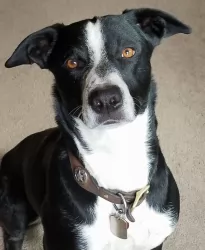 The attractive McNab dog is also known as the McNab Shepherd or McNab Collie. This very lively dog originated in the Mendocino region of Northern California, being specifically bred to withstand tough weather conditions and rough terrain.
The attractive McNab dog is also known as the McNab Shepherd or McNab Collie. This very lively dog originated in the Mendocino region of Northern California, being specifically bred to withstand tough weather conditions and rough terrain.
The dog is becoming popular outside of California now. A Scottish rancher with the surname McNab left Scotland and arrived in California in the 19th century. He crossed Scottish Border Collies with Shepherd dogs and the ranchers in California started using these dogs for herding livestock.
Today they are still being used as herding dogs in California and other countries. The dog isn’t recognized by the American Kennel Club. It was in 2014 that a group of McNab Shepherd breeders established the McNab Shepherd Registry so as to work towards the advancement of the McNab Shepherd.
Basic Information
Group:
Companion dog
Working dog
Origin:
United States
United States
Life Span:
8 - 11 Years
13 - 15 Years
Size:
Medium dog
Medium dog
Other Names:
None
McNab Shepherd, McNab Collie
Colors Available:
white, brown brindle
Black or red with white feet, white tipped tails and white markings around the face
Coat:
have short, coarse hair that tends to shed a lot
Short and dense
Temperament:
Independent, Loving, Loyal, Playful
Affectionate, Alert, Cheerful, Curious, Friendly, Gentle, Independent, Intelligent, Lively, Loving, Loyal, Outgoing, Playful, Protective, Responsive, Social, Stubborn, Territorial
Grooming:
Moderate maintenance
Low maintenance
Trainability:
Moderate
Easy
New Owners Friendly:
Yes
Yes
Description
The first generations of the Beabulls are a 50-50 mix, but most of the breed today are multigenerational dogs. This means a Beabull is mixed with another Beabull to try to create a purebred over time. Most of the Beabulls are a mixture and are very unpredictable in their looks and characteristics, depending upon which of the original parent breeds they favor most.
Many will retain the wrinkles, short legs, underbite and short tail of the Bulldog. Others will have the long droopy ears and long muzzles of the Beagle. Most will have coarse, short coats and shed quite a bit. They are medium to large depending upon which size Beagle is used in the crossing.
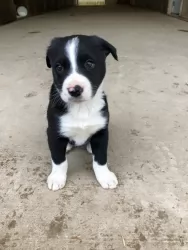 The McNab Dog is a medium-sized working dog. The appearance of this dog varies quite a bit. For instance you may come across a dog with erect ears or floppy ears or a long tail or one that is naturally bobbed.
The McNab Dog is a medium-sized working dog. The appearance of this dog varies quite a bit. For instance you may come across a dog with erect ears or floppy ears or a long tail or one that is naturally bobbed.
When it comes to size, you will find that between the males and females they stand at roughly 40 – 64cm and weigh anything from 14 – 30kg.
Most of these McNabs are black or red with white feet, white tipped tails and white markings around the face. The coat is weather resistant and fairly short and dense. You also get tri-colored McNabs. Eyes are usually a brown or copper color though you might find some with bluish eyes as well.
Temperament:
These are such intelligent dogs so with training and socialization you’ll find he is able to learn easily and quickly. He is a self assured dog, so he will respond well to an owner who is firm and fair, patient, kind and consistent.
He is best suited to life in the country as he needs lots of place to run around. If you don’t live on a farm, take the dog for long walks every day as he requires lots of exercise and mental stimulation. He is a loving family member too, getting along well with kids in the home as well as other pets. He is also a good guard- and watch dog, taking his job as protector of his human family very seriously.
Characteristics
1.Children friendliness – Very good with children.
2.Special talents intelligent and many with a great sense of smell.
3.Adaptability – They can live anywhere in an apartment or a home with a yard.
4.Learning ability – Very intelligent but with a stubborn, independent streak that is inherent in both parental breeds.
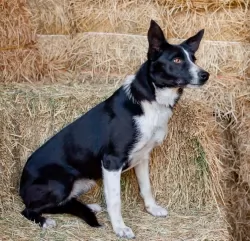 The McNab makes a splendid pet and is known to be even-tempered, being friendly and tolerant with his entire human family.
The McNab makes a splendid pet and is known to be even-tempered, being friendly and tolerant with his entire human family.
He gets on well with children in the home as well as other pets. He has always been a hard working pet and doubles up as being an excellent guard dog too. Those who have had the McNab as a pet say that you couldn’t get a more excellent family canine friend.
Health Problems
Although most Beabulls will not have inherited health problems there are some issues they are all prone to:
• Bloat – can be fatal if not addressed immediately – inverted digestive organs.
• Hip Dysplasia – can cause lameness.
• Canine Disk Disease – can cause paralysis, loss of legs.
• Hypothyroidism
• Ear infections – keep them clean.
• Patellar Luxation – floating kneecaps – can cause lameness.
• Reverse Sneezing
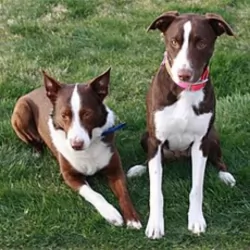 This dog doesn’t really have genetic health issues, but they can suffer with hip dysplasia, a problem that many dogs battle with, whether small or large, young or old.
This dog doesn’t really have genetic health issues, but they can suffer with hip dysplasia, a problem that many dogs battle with, whether small or large, young or old.
They can also suffer with epilepsy and an eye disease such as entropion where the lid of the eye is turned inwards. Check its ears and teeth regularly for infections and keep up to date with his vaccinations.
The McNab is a health dog breed so you aren't likely to face any of these common dog health issues.
Caring The Pet
1.Feeding the puppy – Don’t overfeed due to tendency for obesity and don’t feed right before or after exercise due to threat of bloat. Feed 3-4 meals per day a total of 1.5 cups in a day.
2.Feeding the adult - Don’t overfeed due to tendency for obesity and don’t feed right before or after exercise due to threat of bloat. Feed 3-4 meals per day a total of 3 cups in a day.
3.Points for Good Health no hereditary issues
4. Games and Exercises – both the laziness of the Bulldog and the scent driven energy or the Beagle can be seen in the Beabull. They have short bursts of the Beagles hyperness. Enjoy playing fetch and participating in agility. They need a daily 45-60 minute walk.
Diet:
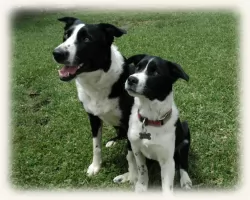 You can feed your McNab dog commercial dry kibble, but then you want to be sure its the best quality one. Buying inferior foods means that you’re getting a whole lot of ingredients in the food that are bad – sugar, salt, preservatives, fillers, colorants etc. Rather go for the best brands that will ensure that your dog is getting all the vitamins and minerals he needs.
You can feed your McNab dog commercial dry kibble, but then you want to be sure its the best quality one. Buying inferior foods means that you’re getting a whole lot of ingredients in the food that are bad – sugar, salt, preservatives, fillers, colorants etc. Rather go for the best brands that will ensure that your dog is getting all the vitamins and minerals he needs.
Homemade food is also important and foods such as boiled chicken, brown rice and pasta as well as cooked or raw vegetables chopped up and added to his dry kibble can make for a delicious, wholesome treat. It will be to his benefit if you can every now and then give him some raw meat as well. Make sure to see that he has a constant supply of fresh, cool water.
Exercise:
McNab Shepherds are very active dogs and they are going to require quite a bit of physical exercise as well as mental stimulation. They are dogs who have been used to herding livestock and he loves this busy life. It is why he wouldn’t be happy living in the city but is better suited to farm life or in a home with a large garden. Long walks and hikes will suit him as well as swimming and joining in every game there is.
Grooming:
The McNab is considered to be a low maintenance dog and grooming the short thick coat will be required twice a week. Always check around the eyes and ears as well as inside the mouth for problems and infections.
Comparison with other breeds
- Beabull vs English Bulldog - Breed Comparison
- Beabull vs Golden Doodle - Breed Comparison
- Beabull vs Pomsky - Breed Comparison
- Beabull vs Old English Bulldog - Breed Comparison
- Beabull vs Puggle - Breed Comparison
- Beabull vs Schnoodle - Breed Comparison
- Beabull vs Aussie Poo - Breed Comparison
- Beabull vs Eurasier - Breed Comparison
- Beabull vs Irish Doodles - Breed Comparison
- Beabull vs Sanshu - Breed Comparison
- Beabull vs German Spitz (Mittel) - Breed Comparison
- Beabull vs Bordoodle - Breed Comparison
- Beabull vs Pandikona - Breed Comparison
- Beabull vs Dalmador - Breed Comparison
- Beabull vs Renascence Bulldogge - Breed Comparison
- Beabull vs Hairless Khala - Breed Comparison
- Beabull vs Jindo - Breed Comparison
- Beabull vs Hermes Bulldogge - Breed Comparison
- Beabull vs Elo - Breed Comparison
- Beabull vs Serbian Tricolour Hound - Breed Comparison
- Beabull vs Kromfohrlander - Breed Comparison
- Beabull vs Valley Bulldog - Breed Comparison
- Beabull vs Whoodles - Breed Comparison
- Beabull vs Mini Sheepadoodles - Breed Comparison
- Beabull vs Dutch Smoushond - Breed Comparison
- Sakhalin Husky vs McNab - Breed Comparison
- Portuguese Water Dog vs McNab - Breed Comparison
- Puli vs McNab - Breed Comparison
- McNab vs American Bulldog - Breed Comparison
- McNab vs Border Collie - Breed Comparison
- McNab vs Alaskan Husky - Breed Comparison
- McNab vs Catahoula Leopard - Breed Comparison
- McNab vs German Pinscher - Breed Comparison
- McNab vs Aidi - Breed Comparison
- McNab vs Griffon Bleu de Gascogne - Breed Comparison
- McNab vs Borador - Breed Comparison
- McNab vs German Spaniel - Breed Comparison
- McNab vs Canadian Eskimo Dog - Breed Comparison
- McNab vs Finnish Lapphund - Breed Comparison
- McNab vs Berger Blanc Suisse - Breed Comparison
- McNab vs Griffon Nivernais - Breed Comparison
- McNab vs Hokkaido - Breed Comparison
- McNab vs Australian Kelpie - Breed Comparison
- McNab vs Griffon Fauve de Bretagne - Breed Comparison
- McNab vs Basque Shepherd - Breed Comparison
- McNab vs Istrian Sheepdog - Breed Comparison
- McNab vs Jamthund - Breed Comparison
- McNab vs Karelian Bear Dog - Breed Comparison
- McNab vs Karelo-Finnish Laika - Breed Comparison
- McNab vs Kintamani - Breed Comparison
 MyDogBreeds
MyDogBreeds Both Beabull and McNab are originated from United States. Beabull may grow 24 cm / 9 inches shorter than McNab. Beabull may weigh 17 kg / 37 pounds lesser than McNab. Beabull may live 4 years less than McNab. Both Beabull and McNab has almost same litter size. Beabull requires Moderate maintenance. But McNab requires Low maintenance
Both Beabull and McNab are originated from United States. Beabull may grow 24 cm / 9 inches shorter than McNab. Beabull may weigh 17 kg / 37 pounds lesser than McNab. Beabull may live 4 years less than McNab. Both Beabull and McNab has almost same litter size. Beabull requires Moderate maintenance. But McNab requires Low maintenance The attractive McNab dog is also known as the McNab Shepherd or McNab Collie. This very lively dog originated in the Mendocino region of Northern California, being specifically bred to withstand tough weather conditions and rough terrain.
The attractive McNab dog is also known as the McNab Shepherd or McNab Collie. This very lively dog originated in the Mendocino region of Northern California, being specifically bred to withstand tough weather conditions and rough terrain. The McNab Dog is a medium-sized working dog. The appearance of this dog varies quite a bit. For instance you may come across a dog with erect ears or floppy ears or a long tail or one that is naturally bobbed.
The McNab Dog is a medium-sized working dog. The appearance of this dog varies quite a bit. For instance you may come across a dog with erect ears or floppy ears or a long tail or one that is naturally bobbed. The McNab makes a splendid pet and is known to be even-tempered, being friendly and tolerant with his entire human family.
The McNab makes a splendid pet and is known to be even-tempered, being friendly and tolerant with his entire human family. This dog doesn’t really have genetic health issues, but they can suffer with hip dysplasia, a problem that many dogs battle with, whether small or large, young or old.
This dog doesn’t really have genetic health issues, but they can suffer with hip dysplasia, a problem that many dogs battle with, whether small or large, young or old. You can feed your McNab dog commercial dry kibble, but then you want to be sure its the best quality one. Buying inferior foods means that you’re getting a whole lot of ingredients in the food that are bad – sugar, salt, preservatives, fillers, colorants etc. Rather go for the best brands that will ensure that your dog is getting all the vitamins and minerals he needs.
You can feed your McNab dog commercial dry kibble, but then you want to be sure its the best quality one. Buying inferior foods means that you’re getting a whole lot of ingredients in the food that are bad – sugar, salt, preservatives, fillers, colorants etc. Rather go for the best brands that will ensure that your dog is getting all the vitamins and minerals he needs.